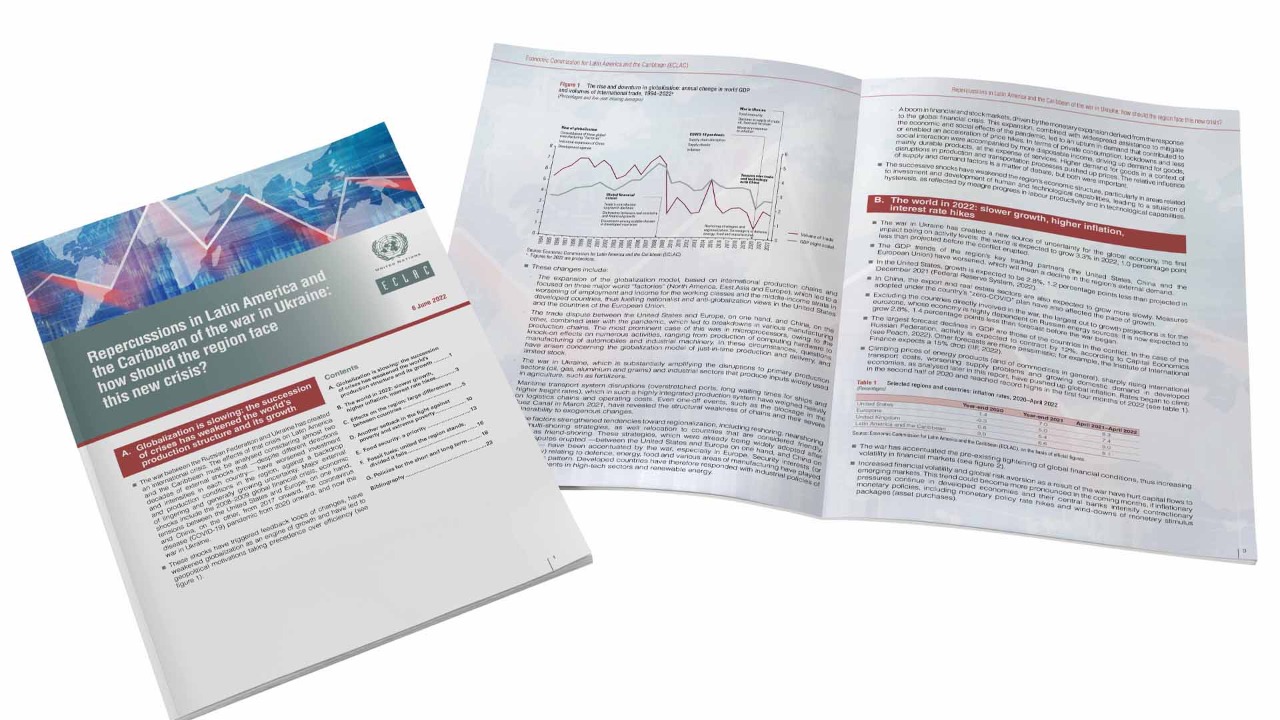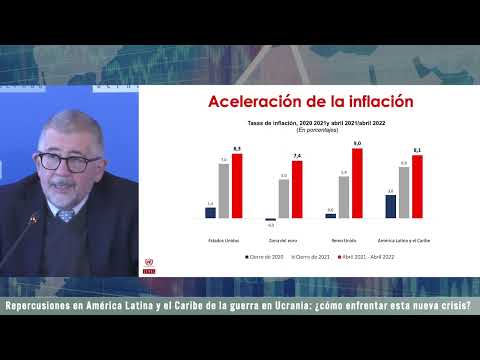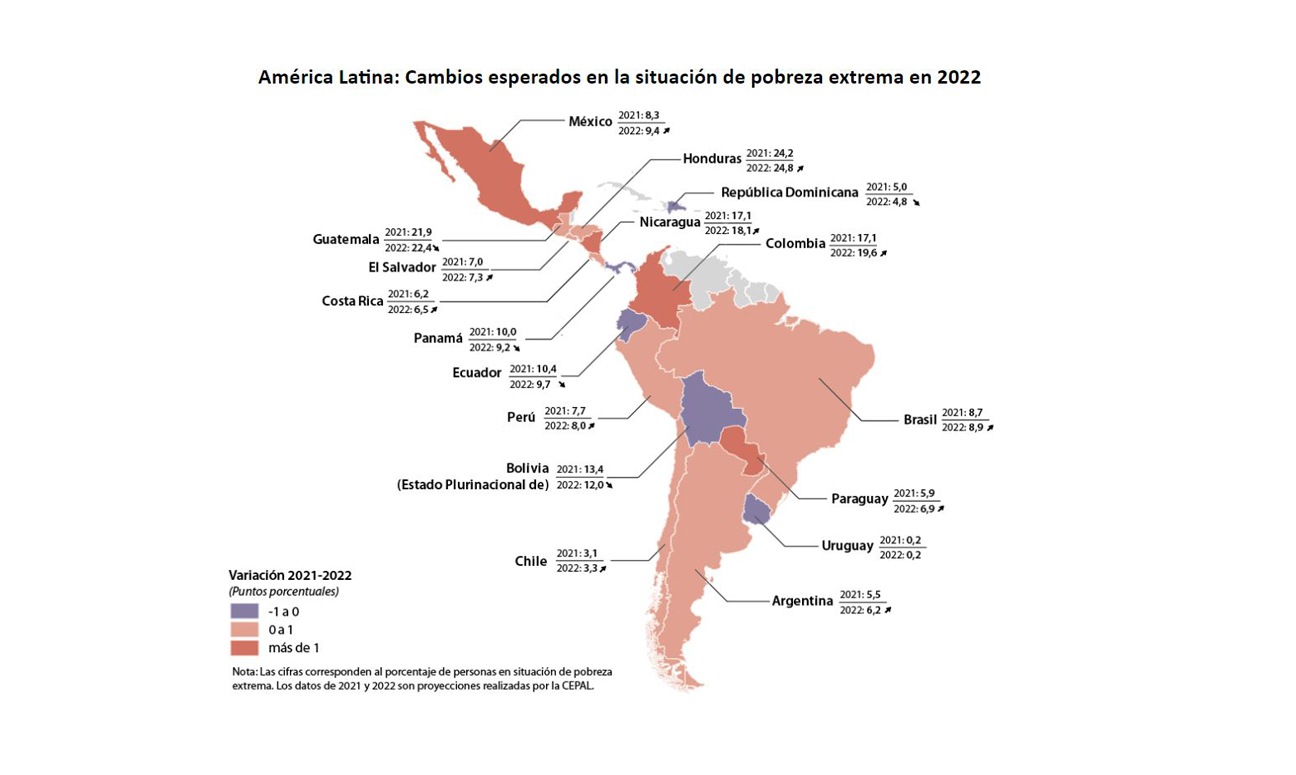War in Ukraine Quickens Inflation, Reduces Growth and Increases Poverty in Latin America and the Caribbean
Work area(s)
A new special report by ECLAC indicates that the economic deceleration, higher inflation and the slow and incomplete recovery of labor markets will increase poverty, extreme poverty and food insecurity in the region in 2022.

The Economic Commission for Latin America and the Caribbean (ECLAC) released a new policy brief today that analyzes the war in Ukraine’s economic and social effects on the region and provides recommendations to countries on how to address them. According to the United Nations regional organization, the region’s economies face a difficult scenario in 2022 in an external context of uncertainty, inflation (particularly in food and energy), and a deceleration of economic activity and trade.
According to ECLAC’s report entitled Repercussions in Latin America and the Caribbean of the war in Ukraine: how should the region face this new crisis?, the region confronts domestic contexts marked by a sharp economic slowdown, rising inflation and a slow and incomplete recovery of labor markets, which will increase poverty and extreme poverty levels. As a result, 7.8 million people are forecast to join the 86.4 million others whose food security is already at risk.
The document – which was presented at a press conference by the Commission’s Acting Executive Secretary, Mario Cimoli – emphasizes that the current situation should not be seen as an isolated phenomenon since its effects meld with those caused by more than a decade of accumulated crises: the international financial crisis, economic tensions between the United States and China, and the pandemic.
In that context, the study indicates that after the economic expansion seen in 2021 (6.3% growth in regional GDP), the region will notch average annual growth of 1.8% in 2022 (as ECLAC stated on April 27) and is seen returning to the slow growth pattern exhibited from 2014 to 2019 (just 0.3% annual growth on average, with the resulting decline in GDP per inhabitant).
Progress on vaccinations, fewer restrictions on mobility and the reopening of schools will drive a recovery in labor participation levels, especially among women, who were the most affected in this regard, having left the labor market in greater proportion to men during the pandemic. The combined effect of greater labor participation and a low pace of growth, and therefore of job creation, is expected to lead to an increase in the unemployment rate in 2022.
The economies of Latin America and the Caribbean began to experience an increase in the inflation rate in 2021. While the region’s annual inflation amounted to 6.6% by the end of 2021, it had risen to 8.1% by April 2022, and many central banks anticipate that inflation will remain high for the rest of the year, the document adds.
Taking the effects of slow growth and accelerated inflation into account, ECLAC forecasts that poverty and extreme poverty will rise above the levels estimated for 2021. The incidence of regional poverty is seen reaching 33.7% (1.6 percentage points above the value projected for 2021), while extreme poverty is seen rising to 14.9% (1.1 percentage points more than in 2021). This outcome reflects the sharp increase in food prices. These levels are markedly higher than those seen before the pandemic and entail another setback in the fight against poverty, the report underscores.
The document adds that higher commodity prices, the increase in transportation costs and disruptions to international supply chains will affect the region’s goods exports. In December 2021, ECLAC projected a 10% increase in the value of regional exports of goods and a 9% increase in the value of imports. However, the price increase for several of the main products that the region buys and sells abroad raises the projection for 2022 to a 23% expansion, both for exports and imports.
Pro-growth fiscal and monetary policies will be needed to respond to the current scenario and stimulate sustainable and inclusive growth. ECLAC proposes continuing to use fiscal policy as a central component of development policy, which requires strengthening public revenue to increase fiscal space. It is necessary to reduce evasion, reorient tax expenditures and bolster the progressivity of the tax structure. To contain inflationary pressures, which are fundamentally driven by supply-related factors, monetary policy must utilize the broadest possible spectrum of available tools. This necessitates combining the use of the monetary policy rate with macroprudential and foreign exchange instruments, with the aim of tackling inflation while minimizing the negative effects on growth and investment.
What is needed without delay is to sustain the welfare of the poorest sectors, the organization warns. Food security must be a priority. Thus, international trade in food and fertilizers should not be restricted since doing so would accelerate inflation and hurt those who are poorest. Officials must also consider measures such as maintaining or increasing food subsidies, implementing agreements with producers and marketing chains to contain prices of items in the basic food basket, and reducing or eliminating tariffs on imports of grains and other basic products.
In the medium term, agricultural and industrial policies are needed to strengthen support for agricultural production while also increasing efficiency in the use of fertilizers, prioritizing biofertilizers. Industrial policy is key to reducing dependence on fertilizer imports in the medium term.
Meanwhile, with regard to energy security, it is essential to make progress on renewable sources and regional energy integration. In the current context, fuel price stabilization mechanisms are needed along with targeted and temporary subsidies for the most vulnerable population groups and the productive sectors geared towards the domestic market, the report emphasizes.
Cimoli concluded the presentation of the report by saying: “Latin America and the Caribbean faces new geopolitical scenarios. The breakdown of globalization may lead to different regional configurations that will define their policies based on sovereignty objectives in defense, energy, food and key industrial sectors, from those involving the highest technology to those of widely used inputs, like fertilizers. In the face of the regionalization of the global economy, our region cannot continue to act in a fragmented way. It is necessary to increase the role of regional coordination in crisis response, formulating and implementing responses by Latin America and the Caribbean as a whole, or its integration blocs.”
Related content
Repercussions in Latin America and the Caribbean of the war in Ukraine: how should the region face this new crisis?
Presentation by Mario Cimoli, Acting Executive Secretary of ECLAC.

Presentación informe especial CEPAL sobre los impactos de la guerra en Ucrania en América Latina
Presentación de Mario Cimoli, Secretario Ejecutivo Interino de la CEPAL, del informe

Menor crecimiento, mayor inflación y aumento de la pobreza en América Latina y el Caribe: ¿Cómo enfrentar los efectos de la guerra en Ucrania?
Los países de América Latina y el Caribe deben fortalecer sus políticas públicas para enfrentar la crisis derivada del impacto económico y social de la guerra en Ucrania. De acuerdo con un…
Related link(s)
Country(ies)
- Latin America and the Caribbean
-
Russia
-
Ukraine
Contact
Public Information Unit
- prensa@cepal.org
- (56 2) 2210 2040